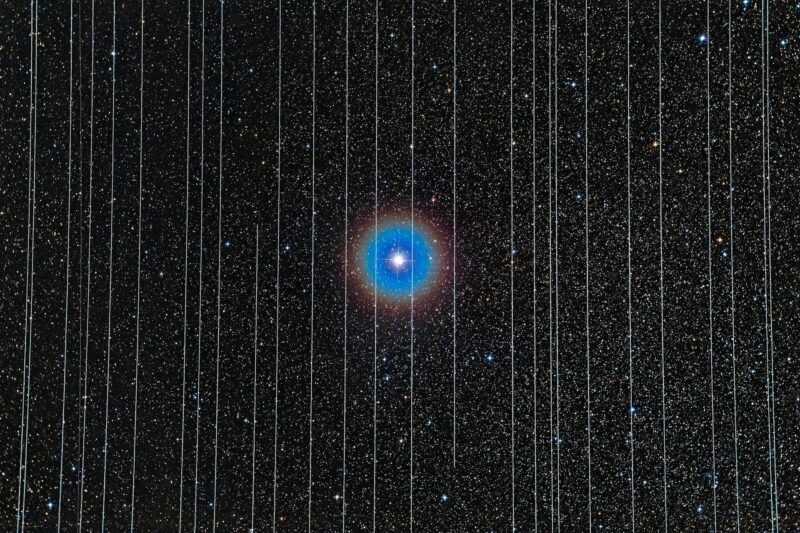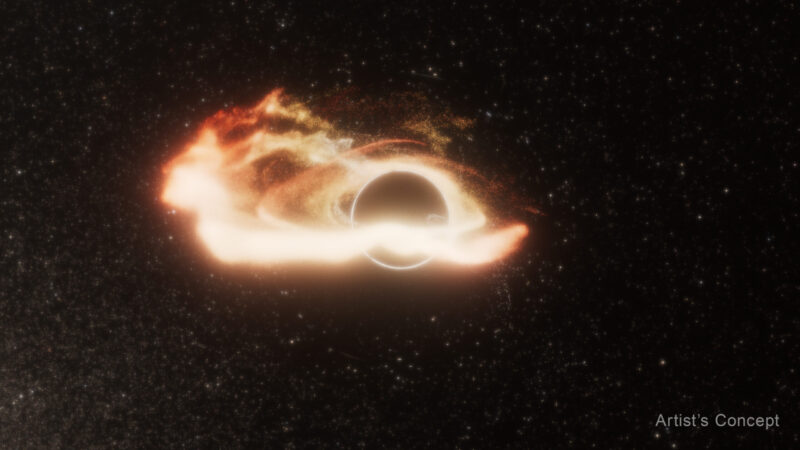Now Reading: Nearby star’s music sparks a surprising discovery
-
01
Nearby star’s music sparks a surprising discovery
Nearby star’s music sparks a surprising discovery

Artist’s concept of the HD 219134 system. Sound waves propagating through the stellar interior – the nearby star’s music as it were – were used to measure its age and size and characterize the planets orbiting the star. Video via openAI/ Gabriel Perez Diaz/ Instituto de Astrofísica de Canarias/ W. M. Keck Observatory.
Science matters. Wonder matters. You matter. Join our 2025 Donation Campaign today.
- HD 219134 is an orange star cooler than our sun about 21 light-years away from Earth. It has a family of five known planets.
- Astronomers listened to the “music” – subtle internal vibrations – of the star, using the Keck Observatory in Hawaii. They found the star is slightly smaller than previously thought.
- The findings also provide more clues about how stars slow down in their rotation as they get older. And they help astronomers measure the sizes and densities of its five planets.
Listening to a nearby star’s music
You might have heard of the music of the spheres or musica universalis. It was an ancient Greek philosophical concept that regarded proportions in the movements of celestial bodies as a form of music. Now, on May 6, 2025, an international team of astronomers using the W. M. Keck Observatory in Hawaii said it has listened to the “music” of a nearby star. The researchers said the subtle stellar vibrations revealed the star is smaller than previously thought, challenging scientists’ understanding of stars’ interiors and how they slow down as they age.
It also helped to better measure the sizes and densities of the star’s five known planets.
Of course, stars don’t actually play music, but they do emit sound waves – subtle vibrations or oscillations – that astronomers can study. Astronomers can “hear” these natural frequencies using the right instruments. And that’s what the team of astronomers did with the nearby star HD 219134, 21 light-years away. They used the Keck Planet Finder (KPF) at the W. M. Keck Observatory in Hawaii to listen to the star. Scientists call this technique of listening to stars’ sound waves asteroseismology.
The vibrations can provide clues about the interiors of stars and other data. Lead author Yaguang Li at the University of Hawaii at Manoa said:
The vibrations of a star are like its unique song. By listening to those oscillations, we can precisely determine how massive a star is, how large it is, and how old it is.
The researchers published their peer-reviewed findings in The Astrophysical Journal on May 6, 2025.

Stellar songs from hot and cool stars
HD 219134 is an orange star, cooler than our sun. It’s been easier to detect such stellar vibrations from hotter stars. With HD 219134, the stellar songs are much more subtle and harder to detect with most telescopes.
But the Keck Planet Finder is ideally suited for this task. It can precisely measure the motion of a star’s surface toward and away from the observer. Overall, the astronomers listened to the star for four consecutive nights and collected over 2,000 velocity measurements. Those measurements were extremely precise. Li said:
KPF’s fast readout mode makes it perfectly suited for detecting oscillations in cool stars, and it is the only spectrograph on Mauna Kea currently capable of making this type of discovery.

Measuring the ages of stars
The oscillations inside stars can also provide clues about their ages and what happens as they get older. Young stars rotate rapidly, but then slow down as they age. The researchers determined that HD 219134 is more than twice the age of our sun, about 10.2 billion years old. The sun and solar system are about 4.6 billion years old. So its rotation is a lot slower now than when it was younger.
But the new analysis of HD 219134 can also help scientists understand another peculiarity. The slowing rotation, or spin-down, of stars similar to HD 219134 tends to eventually come to a halt. The asteroseismic data enables scientists to anchor stellar models at the oldest end of a star’s lifetime. This, in turn, helps astronomers determine the ages of stars more precisely. As Li noted:
This is like finding a long-lost tuning fork for stellar clocks. It gives us a reference point to calibrate how stars spin down over billions of years.
Smaller than expected
The new asteroseismic measurements revealed another surprise, too. HD 219134 is slightly smaller than astronomers thought it was. It’s about 4% smaller than previous studies had suggested. That doesn’t sound like a lot, but it poses challenges for current stellar models, especially for stars like HD 219134.
Why the discrepancy? The researchers said it could be due atmospheric effects in Earth’s atmosphere, magnetic fields or even issues with the stellar models themselves.
W. M. Keck Observatory: Astronomers Tune Into the Music of a Nearby Star Unlocking a Surprising Discovery keckobservatory.org/hd-219134/
— AAS Press Office (@press.aas.org) 2025-05-06T15:40:20.100Z
A family of planets and extraterrestrial life
Like many – or even most – stars, HD 219134 has at least five known confirmed planets, and possibly more, including two super-Earths. Super-Earths are rocky and larger than Earth but smaller than Neptune. Being able to better refine the size of the star also helped the researchers measure the sizes and densities of its family of planets as well.
Keck Planet Finder and similar instruments will also be able to assist in the search for life on exoplanets. Knowing how old the stars and planets are more accurately will help astronomers estimate how old life is on a planet, if it is found. Co-author Daniel Huber said:
When we find life on another planet, we will want to know how old that life is. Listening to the sounds of its star will tell us the answer.
Bottom line: Astronomers have listened to a nearby star’s music – subtle interior vibrations – to learn more about how stars’ rotation speed slows down as they age.
Read more: Cool! A Hubble photo translated to music
Read more: Listen to space with these new sonification videos
The post Nearby star’s music sparks a surprising discovery first appeared on EarthSky.
Stay Informed With the Latest & Most Important News
Previous Post
Next Post
-
 01Two Black Holes Observed Circling Each Other for the First Time
01Two Black Holes Observed Circling Each Other for the First Time -
 02From Polymerization-Enabled Folding and Assembly to Chemical Evolution: Key Processes for Emergence of Functional Polymers in the Origin of Life
02From Polymerization-Enabled Folding and Assembly to Chemical Evolution: Key Processes for Emergence of Functional Polymers in the Origin of Life -
 03Astronomy 101: From the Sun and Moon to Wormholes and Warp Drive, Key Theories, Discoveries, and Facts about the Universe (The Adams 101 Series)
03Astronomy 101: From the Sun and Moon to Wormholes and Warp Drive, Key Theories, Discoveries, and Facts about the Universe (The Adams 101 Series) -
 04Φsat-2 begins science phase for AI Earth images
04Φsat-2 begins science phase for AI Earth images -
 05Hurricane forecasters are losing 3 key satellites ahead of peak storm season − a meteorologist explains why it matters
05Hurricane forecasters are losing 3 key satellites ahead of peak storm season − a meteorologist explains why it matters -
 06Thermodynamic Constraints On The Citric Acid Cycle And Related Reactions In Ocean World Interiors
06Thermodynamic Constraints On The Citric Acid Cycle And Related Reactions In Ocean World Interiors -
 07Binary star systems are complex astronomical objects − a new AI approach could pin down their properties quickly
07Binary star systems are complex astronomical objects − a new AI approach could pin down their properties quickly



















